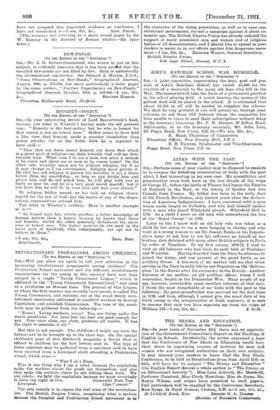HONESTY—POLICY.
[To THE EDITOR OF THE " SPECTATOR."' SIR,—In your interesting review of Lord Beaverbrook's book, Success, you refer to Whately's having made the old proverb run : "Honesty is the best .policy, but he who is honest for that reason is not an honest man." Selden seems to have held a like view that honesty needs a sounder foundation than policy affords; for in the Table Talk he is reported to have said:-
" They that cry down moral honesty cry down that which is a great part of religion—my duty towards God and my duty towards man. What care I to see a man run after a sermon if he cozen and cheat me as soon as ho comes home? On the other side, morality must not be without religion, for if so it may change as I see convenience. Religion must govern it. He that has not religion to govern his morality is not a dram better than my mastiff-dog; so long as you stroke him and please him and do not pinch him, he will play with you as finely as may be, and he is a very good moral mastiff; but if you hurt him he will fly in your face and tear your throat."
By religion Selden meant, as his talk on religion shows, regard for the law of God—not the tenets of any of the dispu- tatious organizations around him.
You refer to. Whately's subtlety. Here is another example of it:— "An honest man has, ceteris paribus, a better knowledge of human nature than a knave, because he knows that there are knaves; whilst the other generally disbelieves the exist- ence of honest men. The higher motives do not exist in the baser part of mankind, who, consequently, are apt not to believe in them."
Blackheath.


































 Previous page
Previous page